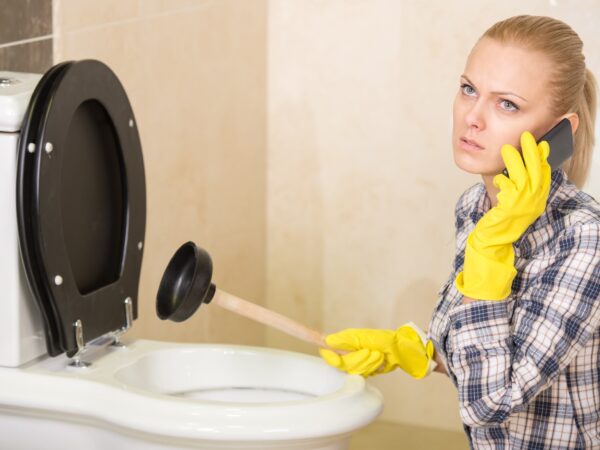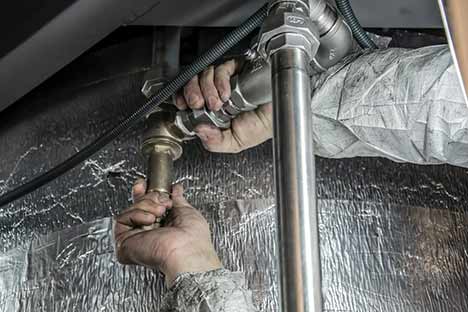Right here down the page you can discover a bunch of first-rate resources about Plumbing Emergencies: Tips on What To Do Before.

Plumbing emergencies can strike at any moment, triggering stress and anxiety and possible damages to your home. Whether it's a burst pipe, a clogged drain, or a leaky faucet, understanding exactly how to handle the circumstance up until an expert plumbing technician gets here can conserve you from more difficulties. This write-up gives crucial emergency situation pipes pointers to aid you minimize damages and gain back control throughout a plumbing crisis.
Turn Off the Water Supply
The first step in any kind of pipes emergency situation is to shut down the water system. For localized problems, such as a leaking faucet or commode, switch off the shutoff near the component. In the case of a major leak or ruptured pipeline, find your home's primary water shut-off valve and transform it off quickly. Recognizing the place of these valves beforehand can save beneficial time throughout an emergency.
Shut Off Your Water Heater
In particular emergency situations, such as a burst pipe, it's wise to shut down your hot water heater. This avoids getting too hot or damages to the unit when water quits moving. Shut off the power supply to the water heater (electrical or gas) and allow it cool down to stay clear of possible risks.
Temporarily Quit a Ruptured Pipe
A ruptured pipeline can lead to substantial water damages in minutes. To minimize the problem:
Call a professional plumbing professional promptly to deal with the trouble permanently.
Have an Emergency Pipes Kit
Prepare a standard plumbing emergency situation kit to take care of minor concerns efficiently. Your package ought to include:
Having these devices available can make a substantial difference in your capability to manage emergency situations.
Unclog Drains Safely.
A clogged up drain can be an irritating and untidy concern. Here's exactly how to tackle it:.
If these approaches do not work, prevent utilizing too much force, as it may aggravate the clog.
Take Care Of Overflowing Toilets.
An overflowing bathroom can create immediate mayhem. Below's what you should do:.
Address Little Leakages with Temporary Fixes.
Little leaks can swiftly come to be significant problems if left unattended. Utilize these momentary solutions until expert assistance gets here:.
While these fixes aren't permanent, they can aid decrease water loss and damages.
Manage Frozen Pipeline Meticulously.
In cooler environments, frozen pipes are an usual emergency situation. If you think a frozen pipeline:.
Know When to Call a Professional.
While quick fixes can help temporarily, certain plumbing concerns call for prompt specialist interest. Call a plumbing if:.
Without delay calling an expert guarantees the issue is resolved appropriately and stops additional problems.
Protect against More Damages.
Taking fast action to reduce damage can conserve you time and money in the long run. Below's exactly how:.
Conclusion.
Pipes emergencies can be overwhelming, yet with the right understanding and devices, you can manage the circumstance efficiently up until aid arrives. By shutting off the water supply, dealing with tiny leakages, and using momentary solutions, you can minimize damage and maintain your home safe. Keep in mind, these pointers are short-term options; constantly consult a certified plumbing technician to take care of the root cause of the trouble. Preparation and quick thinking are your finest allies in any kind of pipes emergency.
8 Helpful Tips for Managing Plumbing Emergencies at Home
If your plumbing system hasn’t failed once, wait for it because almost everyone has a story to tell. Sometimes, it could be simple emergencies such as a leaking pipe, a blocked cistern, or even a big burst pipe. In situations like this, you need to have some handy tips to save you some money and from possible damages.
Take care of minor issues early.
Sometimes, you could have avoided an emergency by taking proactive measures while it was still early. Some major plumbing emergencies can be a result of an ignored minor issue. We recommend that you have items like plumbing tapes and other related items. A plumbing tape can allow you to manage minor leaks before the plumber arrives.
Cut off the water supply.
This tip is essential in almost any type of leakage problem. For problems like minor leakages in the toilet or kitchen, turn off the supply that takes water to the affected pipes. If the leakage is a major pipe, you must shut off the supply valve to the entire building. This will help you avoid flooding your home and neighbors if you share a flat.
Know your plumbing system
Folks typically move into a new apartment without understanding the water supply around the building. This can prove disastrous if a water emergency arises and the plumber is far away. The previous tip will prove useless if you don’t practice this one. More importantly, know where your water shut-off valve is located – you’ll need that knowledge to prevent potential home floods.
Have some common handy tools
There are lots of plumbing emergencies that you can handle without hiring a plumber. That’s why you must keep some tools available always. Some tools that you can use to fix simple plumbing emergencies easily include plumbing tapes, screwdrivers, thread seal tapes, plungers, pliers, tape measures, and rubber gloves.
Insulate your pipes from cold
You’ll save yourself from many plumbing expenses if you protect your water pipes from the cold. This is because of the harmful effects that cold weather can have on your pipes. During winter, your pipes can burst from being overly expected to freezing temperatures. So, make sure insulators are there to keep the pipes working correctly.
Avoid practices that will clog your toilet.
Many people indulge in practices that can damage the plumbing system of the entire building. One of these is when they use their toilet to dispose-off garbage. They flush all kinds of things, such as paper towels, bandages, hairs, female sanitary products, etc., down the toilet. This will block your toilet in the long run, incurring unnecessary expenditures. Dump such waste in the trash instead.
Check your dials regularly.
Sometimes, there could be leakages in your home without noticing them in time. So, constantly monitor your water meter dial. If the dial is reading when there is nobody using water, this is an indicator that there is leaking. Check for leaks immediately. Call a plumber as soon as possible if you can’t find any.
https://www.constructionplacements.com/8-helpful-tips-for-managing-plumbing-emergencies-at-home/

I came across that post about What to Do During a Plumbing Emergency while doing a lookup on the internet. Those who liked our blog post if you please be sure to share it. Thank you for being here. Don't hesitate to visit our blog back soon.
Schedule Service Now